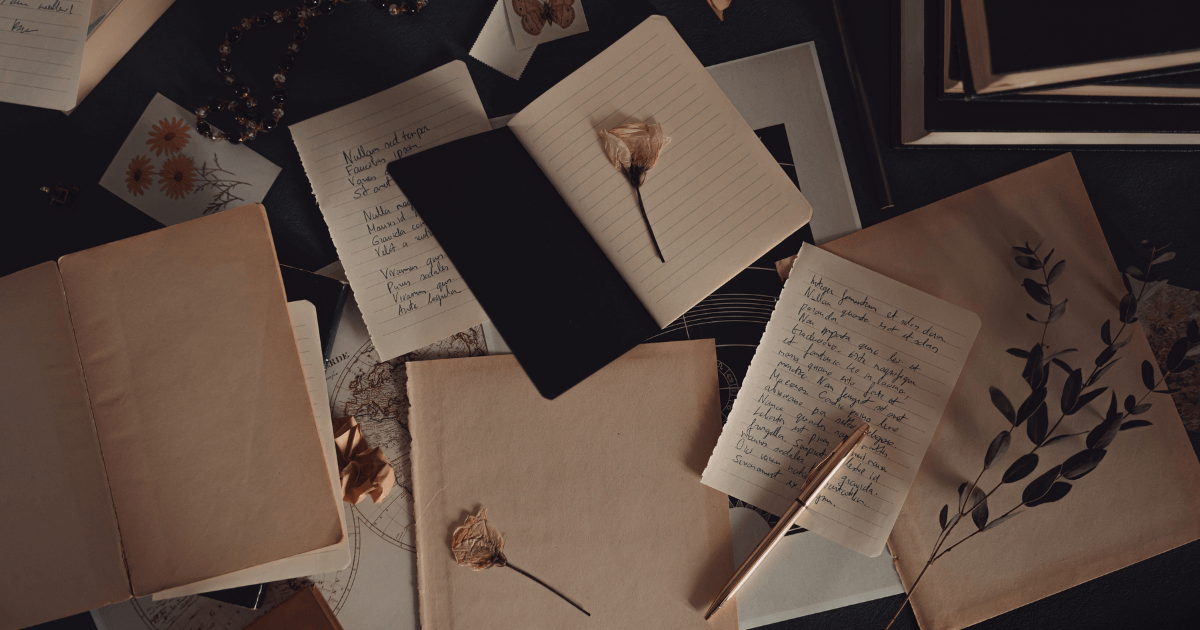
Here’s help for when it happens. You know IT, that moment you must write a poem. It may be an internal desire or external pressure (shout out to students and poets publishing everywhere)
You may want to write a poem to express your innermost self, to celebrate someone, to explore the world, or to finish an assignment. You may be writing for someone special, for yourself, for your community, your teacher, or the world. This poem may be published or shared or not. Even if you are the only one to read this poem, you want to write it.
If only you could get an idea to start.
The following list offers a variety of options. It’s like a choose-your-own-adventure for poets!
You could dive in, grab a topic at random and begin brainstorming.
Skim the list, and only read what catches your eye to spark your writing.
Scour for a topic or heading you have considered before and notice if any of the ideas take you to a new spot to start your poem.
Don’t worry if others have written on the same topic. You are unique. No one else has experienced the world exactly the way you have. Poetry gives you a chance to explore your authentic voice, creativity, and imagination.
How many times have you read a deeply personal poem that resonates with you?
So often, we find the connection to others in what can seem like a very particular viewpoint. When a poet writes about holding their newborn or their dying parent’s hand, we feel our shared humanity.
Trust your heart and experience to help you share your voice.
And play. See where your mind and creativity take you. Spin around and point a finger anywhere on the list to challenge yourself with an unexpected idea.
However you use this list, it is here for you. Don’t get stopped by IT.
Let’s get sparking!
Poem Topics About Nature
Inspiration from the wonder of nature is just, well, natural. Here are a few ideas to spark your creativity with this limitless topic.
- Take a walk and focus on one sense at a time. Push past the first few things you notice to see what you hadn’t heard or seen before.
- Choose one specific thing, a tree or a bird, and write about it in detail.
- Look for contrasts in nature like seasons or landscapes.
- Connect a natural object to a human condition or emotion, for example:
- A pebble tossed on the beach: controlled by larger forces in life
- A flower growing through a crack: resilience of a person
- Birds flying: freedom of movement
- Seahorses: flexibility
- Focus on a natural wonder or moment
- Storm, hurricane, tornado, or thunderstorm
- Volcano
- Waterfall
- Riptide
- Rainforest
- Sea or waves
- Stars, comet, or moon
- Moments you have been impacted by nature
- Bugs: black flies, ticks, dragonflies
- A single mosquito in the bedroom at night
- Weather: rain, snow, dust storm
- A rainbow seen after being drenched by rain
- Animals: mice, fish, turtles, cows
- The flash of a deer’s tail as you drive at night
- The wild within your pet
Check out John Donne’s poem, “The Flea,” for an interesting example of using an element of nature to inspire a poem
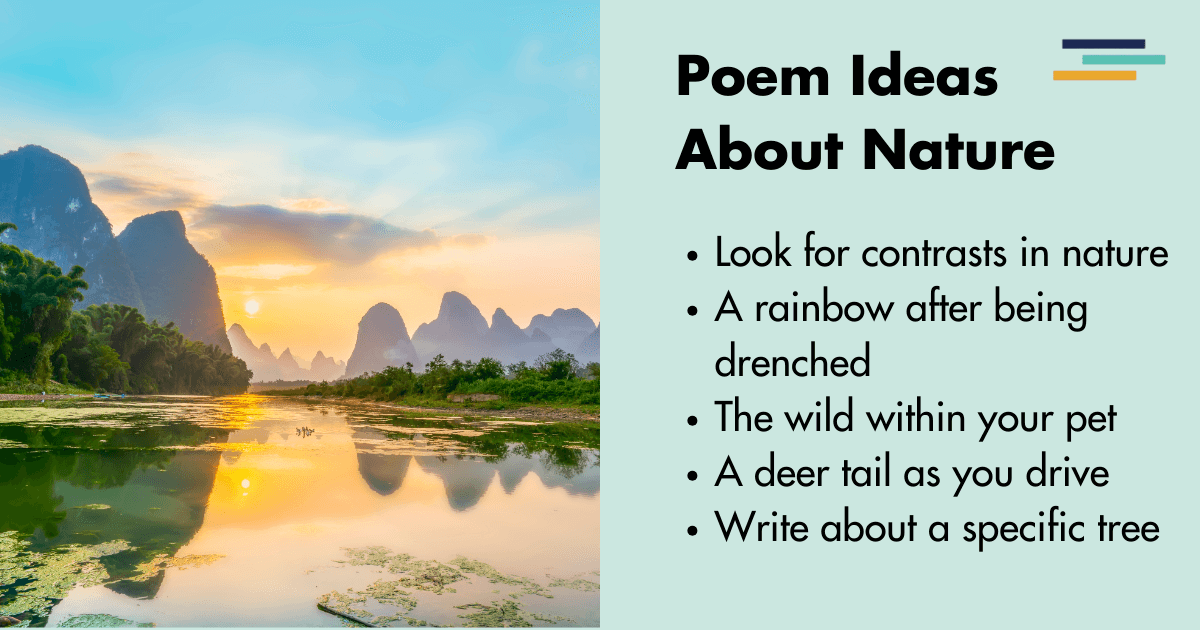
Poetry Ideas About Love
Take a moment to consider all the types of love in the world. Each of these can be a starting place for you to express the power of love. Get ready to write your next great love poem.
- Types of love between people
- Romantic
- Platonic
- Self-love
- Love of family
- Love of friends
- Potential love
- Dream lover
- Soul mate
- Imagined future : partner, child, pet
- Love lost
- A relationship that has ended. Think about what is lost and gained
- Someone you loved who has died: who they were, how you felt and feel. Make it a tribute or ode.
- Distance and Separation
- Long distance relationship
- Separated by: work, family, friends, choices
- Emotions, thoughts, fears, or hopes
- Concepts of Love
- Falling in versus falling out of love
- Unexpected love
- Unconventional love
- Enduring love
- Take one word associated with love and explore what it might mean: red, heart, flowers, or chocolate
- Take an opposite or contrasting word and explore what it might mean for love. Instead of red, blue; instead of heart, liver; instead of flowers, stones; instead of chocolate, onions
Check out Carol Anne Duffy’s poem, “Valentine” to read about a very different Valentine’s gift
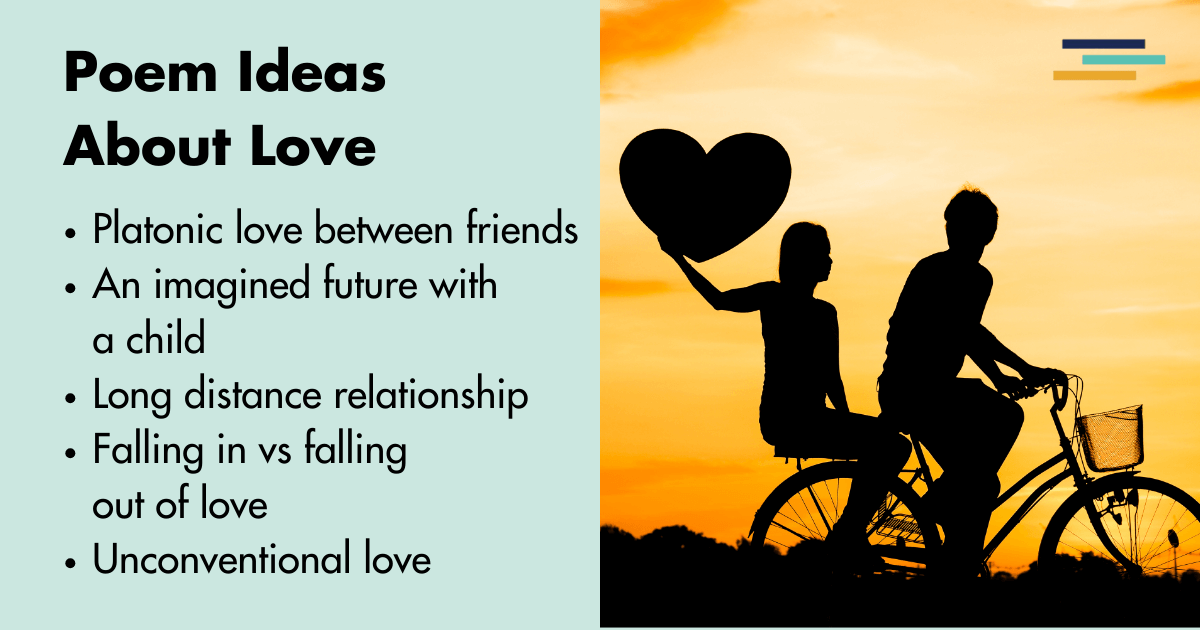
Topics for Poems About Death
There are many poems already written that try to give comfort and help those dealing with death, dying, and grief. The following few prompts deal with death as a topic for poetry. Take care of yourself first. Please read with discretion, and move on to another topic if you find any prompts triggering or uncomfortable.
- Death has been personified in poetry. Giving death human qualities and a face allows the poet to interact with the concept. Some belittle death, some rage, some plead, and some try to understand. If death were a person, what would you like to say or do? Does artistry or creation of things that last beyond a human life make you immortal?
- What happens after death? From different cultural beliefs to our own thoughts and imagination, humans have wondered what happens after death. Are there metaphors or images that give you comfort or understanding?
- Looking beyond our own death because some see dying as part of a larger creative process. We see leaves die and fall from trees to ensure the tree survives and is able to sprout new leaves in the spring. Where do you see death as part of a cycle of life? Can you see the cycle in other aspects of the world? Technology?
- Mobile phones replacing home phones
- Cars over horses for transportation
- Is death part of learning and growing as individuals? Do old beliefs have to die to be replaced with new ones? Is death part of the creative process?
Good Poem Topics About Emotion
Every emotion can offer opportunities for poetry. Below is a list of both emotions and prompts that might elicit an emotion or memory of an emotion. If you take the challenge, these prompts may lead you into a place of vulnerability in writing and create a deep connection for your readers.
- Happiness: What makes you happy? What brings you joy? What moments brought you happiness? Who do you think of and smile?
- Sadness: What makes you sad? When you think of the word sorrow, what are your first thoughts or memories?
- What makes you fearful or frustrated? Use the source as the focus for your poem.
- Read the following list and choose one word to brainstorm from:
- Amusement
- Annoyed
- Anxiety
- Awe
- Boredom
- Brave
- Contempt
- Disgust
- Empathy
- Envy
- Gratitude
- Jealousy
- Nostalgia
- Regret
- Shame
- Surprise
- Tender
- Trust
- Vulnerability
- Link any of these bodily sensations with emotions to trigger ideas
- Achy
- Breathless
- Bruised
- Cold
- Dizzy
- Jumpy
- Loose
- Prickly
- Settled
- Shaky
- Sparkly
- Still
- Suffocated
- Twitchy
- Wobbly
Check out W.B. Yeats’ poem, “When You Are Old,” to inspire emotion and memory.
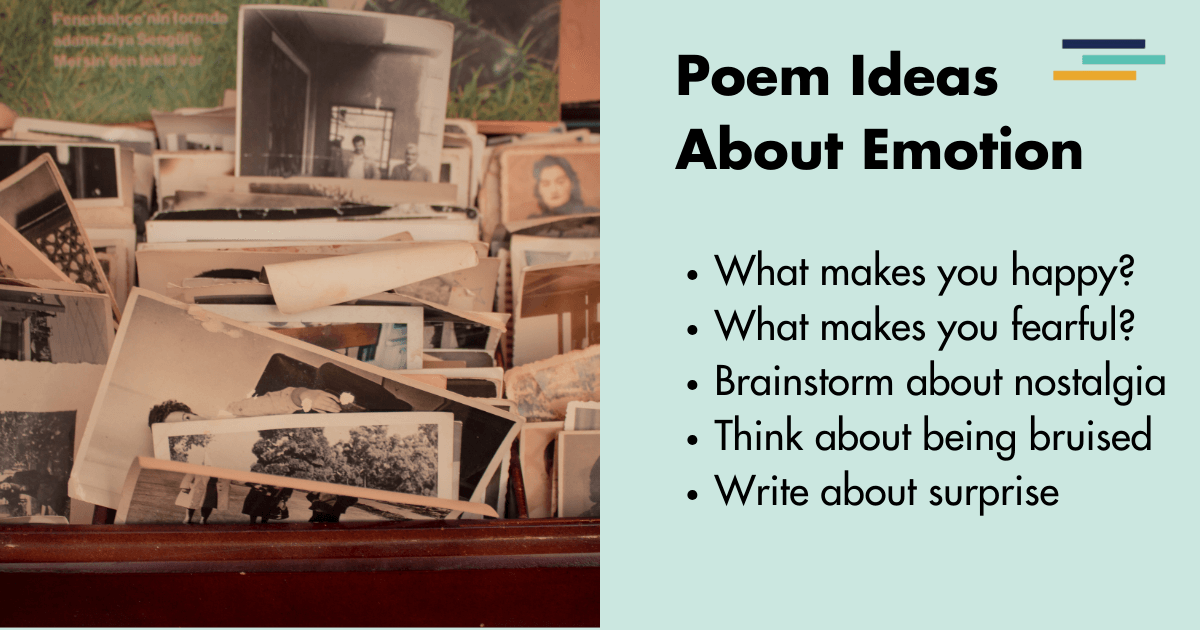
Poetry Topics About Politics, History, and Culture
As you reflect on the world around you, national and international events may seem too overwhelming to choose as a topic for your poetry. Check out the topics below to be inspired to find the intimate and real within larger issues of our time.
- Begin with childhood memories. Is there a moment from your childhood that touches on your understanding of the history and culture around you?
- Write about the personal impact of a significant event. This may be a large global crisis or a small local incident. Explore your thoughts and feelings as you reflect on the event.
- Consider struggles faced by individuals and groups. What was gained and lost in the struggle? Is there a viewpoint or individual that sparks your creative interest? Write the poem from that perspective.
Check out Brendon Joyce’s poem, “Nobody Wants To Work,” as an example of using a single viewpoint to explore political topics.
Using Poetry Groups and Movements to Generate Poem Ideas
Poets may be grouped by focus, topic, or self-identification with other poets. Consider any of the following ideas to inspire your next poem, or research to discover other movements that could help you see the world and poetry in a new way.
The following are only a few examples of groups that could provide inspiration for your next poem. Equally, you may discover a spark in exploring the opposite of any of these ideas.
- Romanticism: This stressed strong emotion, imagination, and freedom from the classical notion of form in art. Work expressed spontaneous feelings, found parallels to their emotional life in nature, and celebrated creativity over logic.
- Just feel in the moment. Write about the emotion that comes forward first.
- Remember a strong emotional moment in your life. Think about what aspect of the natural world you can see a connection with. Explore that reflection in your poem.
- Celebrate creativity.
Check out William Wordsworth’s poem, “I Wandered Lonely as a Cloud.”
- Symbolism: These poets tried to capture absolute truths through indirect methods like metaphors and symbolic meaning.
- What do you think is an absolute truth in art? What symbols inspire your understanding of life and truth?
- Write an extended metaphor.
Check out Paul Verlaine’s poem, “Last Hope.”
- Imagists: They rejected Romantic and Victorian conventions for precise imagery and clear, plain language.
- Choose a subject and use simple, clear language to create an image.
- Look at an everyday object and create an image using precise, colloquial language
Check out Ezra Pound’s poem, “In a Station of the Metro” and William Carlos Williams’ poem, “The Red Wheelbarrow.”
- Martian poets: They used humorous metaphors to describe ordinary things as if through the eyes of a Martian.
- Imagine you are a visitor from another planet and describe common objects
For inspiration read “A Martian Sends a Postcard Home” by Craig Raine.
- Nuyorican poets: They gave rise to poetry slams. These poets wrote and recited dramatic poetry with humor and rage about social injustice, discrimination, and U.S. colonialism in Latin America and the Caribbean.
- Capture a memory of a social injustice from your life. Write a poem focusing on the strong emotions felt. Let the words create a rhythm as you read them aloud.
Check out “The Broken English Dream” by Pedro Pietri to get a sense of the rhythm and power of this poetry.
Play with Forms
Sometimes, it is fun to play with different forms. Consider some of these types of poems and poetry styles. Use the structure as a framework for your poem. Don’t be too focused on making your poem fit exactly, at least to start. This is about sparking creativity.
- Acrostic: the first letter of the first word on each line spells out a word. So, just pick a word and write.
- I Am: This is a poem all about you that doesn’t have any other rules.
- Limerick: Funny poems with a set rhyme scheme of AABBA with the lines one, two and five all longer than lines three and four. The last line is often the punchline.
- Narrative: This poem tells a story. Ballads are a type of narrative poem. You could take an old story and write it as a narrative poem.
- Rhyming Couplets: The last word in each of the two consecutive lines rhyme. How many rhyming couplets can you make about a topic?
- Sonnet: Ready for a challenge? Sonnets are made up of 14 lines with a specific rhyming scheme. Petrarchan sonnets follow an ABBA ABBA CDE CDE rhyme scheme. Shakespearean sonnets usually use the rhyme scheme of ABAB CDCD EFEF GG (ending with a rhyming couplet).
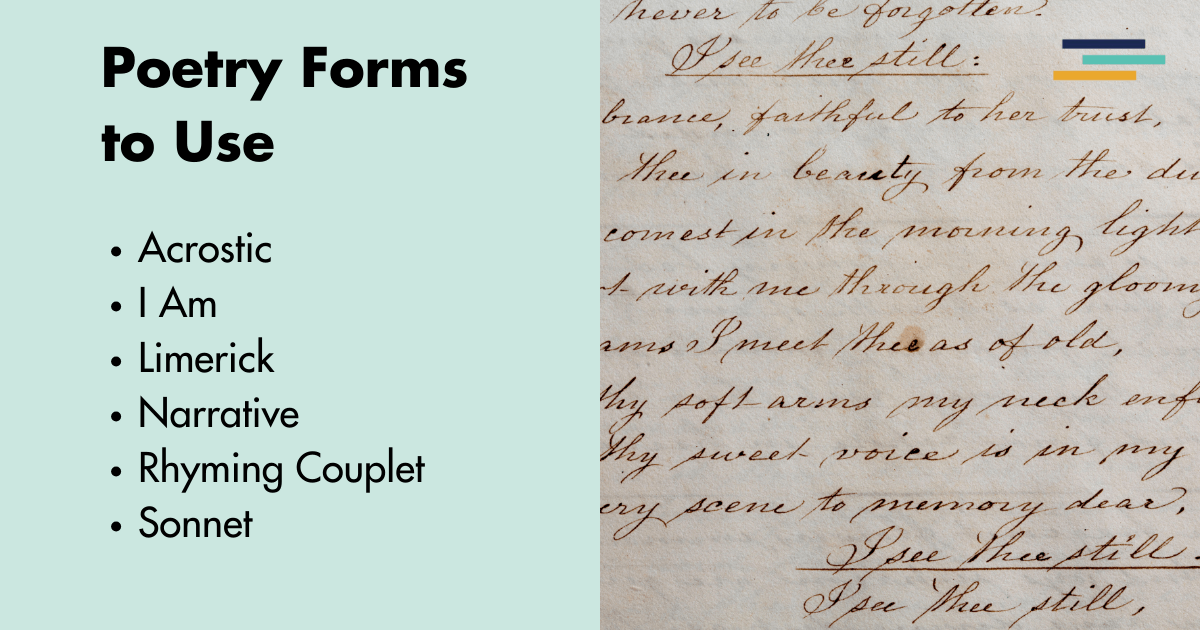
How to Choose What to Write a Poem About
As well as the suggestions above for sparking your creativity, there are a few easy tips to help you decide what to write a poem about.
Begin with you. The old adage is to write what you know. What exactly does that mean? What does it look like?
Here are a few ideas to help you use this advice to choose your topic:
- Use your memories: When you write from memory, you have both the feelings you experienced at that past moment and your reflection on the experience now. How cool is that? Depth built into what you know intimately.
- Use your perspective of the world around you: What do you feel about the world outside yourself? How do you experience the world? Use this understanding and emotion to help choose your topic. For example, from Nature you have chosen to focus on a flower in your garden. As well as looking at the senses, take a wider look at the flower. What is your perspective of the place of flowers in gardens? What about your individual garden compared to those who don’t have gardens or land? How does a close look at that flower impact how you see yourself within the wider world?
- Use your perspective about yourself and your relationships: When you choose a topic from the list, use yourself as the fuel. Only you have a deep understanding of how you feel about yourself and those around you. Even if you have picked a topic that seems outside yourself, begin within. Remember that flower you picked to write about? Well, it was a specific flower in your garden. Already, the topic is linked closely to you. Now, explore this from your understanding of yourself. What do you see? Which sense is most powerful for you?
How to Explore Ideas for Your Poem
Consider trying this simple system for developing ideas for your poem.
- Notice: Jot down your first thoughts.
- Second thoughts: What else do you notice? Write down the challenges that come immediately to mind.
- Five more things: For each idea, follow it through by asking “and what else?” at least five more times.
- Emotion: Write any emotions that pop into your mind.
- Senses: For each of the five senses, write at least one word. Ideally, try five words.
- Connections: Free write a connection to any words in your list so far.
- Random: Highlight or circle five words from your list. Rewrite them on a new sheet. What new connections do you see? Add those in.
With this quick brainstorm, you will have a variety of words and images to help keep your creativity sparking as you write your poem.
Play as you explore where the words and images take you.
Then, write your first draft. Play. Make a mess.
Whatever inspired your desire to write a poem, you have a unique voice and viewpoint to share with the world.
Come back any time for inspiration whenever IT happens.


